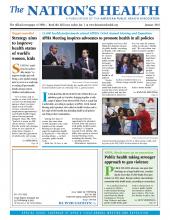Access to Medicaid coverage during childhood may lead to health improvements during adulthood, according to a recent study.
The results were published online Nov. 19 in the Journal of Health Economics.
The improved health findings are important considering the recent effort to expand Medicaid coverage to low-income adults under the Affordable Care Act, said Michel Boudreaux, PhD, MS, lead study author and assistant professor at the Department of Health Services Administration in the School of Public Health at the University of Maryland-College Park. While all states have Medicaid coverage for kids, the coverage varies from state to state, he said.
“What our research suggests, and a lot of other work, is that when states make these decisions, they shouldn’t just be thinking about costs and benefits that happen today, but the costs and benefits that accrue over a long period,” Boudreaux told The Nation’s Health.
Medicaid is a federal program intended to increase access to care for U.S. low-income families and became a coverage option in nearly all states by 1970, according to the study.
Researchers used the Panel Study of Income Dynamics 1968-2009 to track the long-term effects of Medicaid of a sample of Americans exposed to the program during childhood and how it affected their health at age 25 and older.
There was a 22 percentage point decrease in having high blood pressure among low-income Americans compared with a 12 percentage point decrease among moderate-income Americans, who were least likely to access Medicaid. However, the decrease for moderate-income Americans was not statistically significant, Boudreaux said.
“I think we did expect to find something, but we didn’t expect the size of the effects would be so big,” Boudreaux said. “I think it’s important to think about things like blood pressure. It’s a big risk factor for cardiovascular disease. And it’s a condition we spend a lot of money trying to treat. If we can prevent things like hypertension we’re going to save a lot of money and we’re going to be a lot better off.”
Boudreaux said the takeaway for public health practitioners is that when they invest in children’s health, it creates long lasting benefits.
“Public health programs have to make hard tradeoffs about where they’re going to spend money, what programs to invest in,” Boudreaux said. “Our results suggest that the investments we make in kids really have big payoffs because those payoffs can last a lifetime.”
For more information, visit www.sciencedirect.com/science/article/pii/S0167629615001216.
- Copyright The Nation’s Health, American Public Health Association









